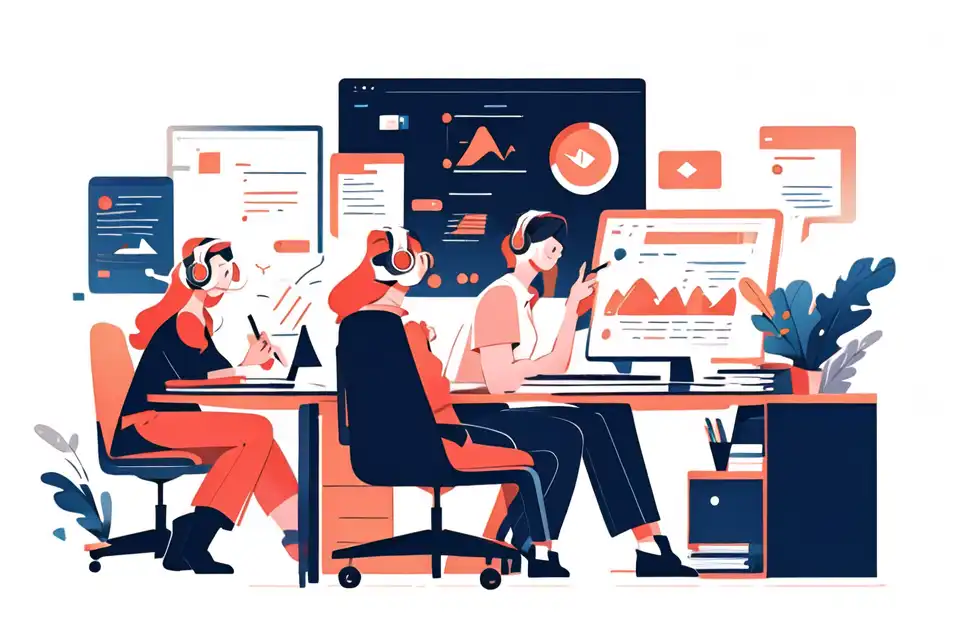How to Request Information From a Colleague Professionally
Master the art of professional communication in business settings with expert guidance. Learn how to request information from a colleague professionally.
Try Lark for Free
Effective communication within the workplace is fundamental to achieving common goals. The ability to ask for information from colleagues in a professional manner is crucial in nurturing a positive and collaborative work environment. By developing a deeper understanding of the strategies and best practices for requesting information professionally, individuals can establish stronger relationships with their colleagues, leading to enhanced productivity and overall job satisfaction.
Why is it important to understand how to request information from a colleague professionally
Asking for information from colleagues is a common occurrence in professional environments. Understanding the significance of approaching this communication skillfully can significantly impact work dynamics.
- Building strong relationships in the workplace: Professional and respectful communication when requesting information fosters positive relationships with colleagues, contributing to a harmonious work environment.
- Creating a positive working environment: By acknowledging and validating the expertise of colleagues when requesting information, a workplace culture that promotes mutual respect and support is cultivated.
- Fostering effective communication: Learning to request information professionally enhances overall communication within the organization, leading to clearer and more concise exchanges of information.
Use Lark Messenger to elevate your team communication.
Practical examples of dealing with how to request information from a colleague professionally
Example 1
Example 1
A typical scenario when you don’t know how to request information from a colleague professionally
Imagine you need specific data from a colleague to complete a project report, but you are unsure of the appropriate way to request this information.
Common mistakes made in this scenario
-
Using demanding language, such as "I need this now."
-
Disregarding the colleague's workload and time constraints.
-
Failing to express appreciation for the colleague's assistance.
Best expression in quotes for the scenario
"Hi [Colleague's Name], I hope you're doing well. Would you be available to provide the data on [specific topic] by [deadline]? Your expertise in this area would be incredibly valuable to ensure the accuracy of our project report. Thank you in advance for your support."
Example 2
Example 2
A typical scenario when you don’t know how to request information from a colleague professionally
Consider a situation where you need guidance from a colleague regarding a new process being implemented in the organization, but you are uncertain about the most appropriate way to seek their input.
Common mistakes made in this scenario
-
Sending an abrupt and vague email without providing context for the request.
-
Neglecting to acknowledge the colleague's expertise and experience in the subject matter.
-
Failing to express gratitude for the knowledge and support being sought.
Best expression in quotes for the scenario
"Hello [Colleague's Name], I hope you are well. I would greatly appreciate your insight and guidance regarding the new process being implemented. Could we schedule a brief meeting or discussion at your earliest convenience? Your expertise in navigating such transitions would be incredibly valuable as I adapt to these changes. Thank you for your time and support."
Example 3
Example 3
A typical scenario when you don’t know how to request information from a colleague professionally
Envisage a situation where you require specific details from a colleague to complete a client proposal, but you are unsure about the most respectful and professional way to make this request.
Common mistakes made in this scenario
-
Using excessively casual language, such as "Hey, can you send me that stuff?"
-
Neglecting to outline the urgency of the request.
-
Failing to recognize the contribution of the colleague in advancing the project.
Best expression in quotes for the scenario
"Good day, [Colleague's Name]. I trust you are doing well. I wanted to inquire if you could provide the detailed specifications necessary for the client proposal by [specific deadline]. Your expertise in this area and timely input would greatly enhance our proposal's quality and effectiveness. Thank you for your attention to this matter."
Example 4
Example 4
A typical scenario when you don’t know how to request information from a colleague professionally
Consider a scenario in which you need historical data from a colleague to support a research project, but you are uncertain of the most effective approach to seek this information.
Common mistakes made in this scenario
-
Failing to provide context for the request, leading to ambiguity.
-
Overlooking the colleague’s workload and assuming immediate availability.
-
Neglecting to express gratitude and acknowledge the colleague's contribution to the project.
Best expression in quotes for the scenario
"Dear [Colleague's Name], I hope this message finds you well. I am currently working on a research project and require historical data within the next few days for comprehensive analysis. I understand the demands on your time and expertise and would be immensely grateful for your support in providing this information. Thank you for considering this request."
What are the consequences of not knowing how to request information from a colleague professionally
Lacking proficiency in requesting information professionally from colleagues can lead to various negative outcomes within the workplace.
- Miscommunication and misunderstandings: Ineffective requests can lead to misinterpretation of needs, resulting in inaccurate or incomplete information.
- Damage to professional relationships: Inappropriately phrased requests can strain relationships, leading to decreased collaboration and support from colleagues.
- Impact on productivity and efficiency: Poorly executed information requests can cause delays in project timelines and hinder the overall productivity of the team.
Learn more about Lark x Communication
Use Lark Messenger to elevate your team communication.
Methods of phrasing how to request information from a colleague professionally
Different situations may require specific methods of phrasing requests to ensure that the communication maintains a respectful and professional tone. Method 1: Direct and polite inquiries
- Clearly and respectfully state the required information and its purpose.
- Acknowledge the colleague's expertise and express appreciation for their contribution.
- Provide a specific timeline or deadline if applicable.
Method 2: Providing context for the request
- Offer necessary background information to provide the colleague with a clear understanding of the request.
- Ensure that the purpose and significance of the information request are well-explained.
- Acknowledge the colleague's valuable insight and support.
Method 3: Offering assistance in return
- Express willingness to reciprocate support or assistance in an area where the colleague may require help.
- Emphasize the mutual benefit of assistance, fostering a supportive exchange of information in the workplace.
- Convey gratitude for the collaborative effort and support.
Do's and dont's when you don’t know how to request information from a colleague professionally
| Do's | Dont's |
|---|---|
| Clearly state the needed information | Use vague or demanding language |
| Acknowledge the colleague's expertise and time | Disregard professional courtesy |
| Thank them for their assistance | Overlook the importance of follow-up communication |
Conclusion
Understanding the nuances of requesting information professionally from colleagues contributes to a harmonious and collaborative work environment. By adopting effective communication strategies and demonstrating respect for the expertise of colleagues, individuals can forge stronger professional relationships and enhance overall productivity.








